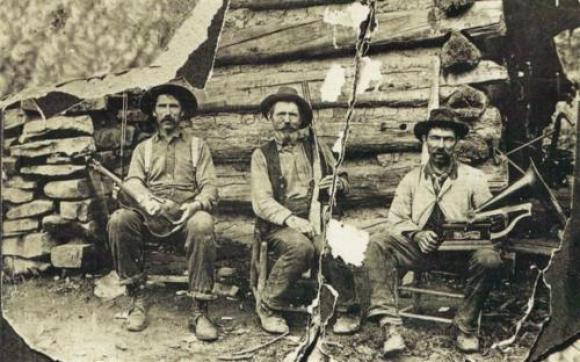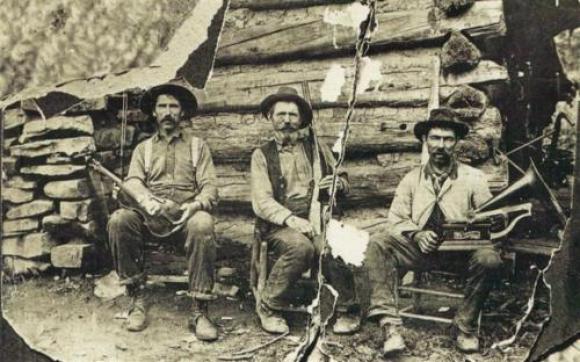My name is Tom Daniel, and I’m a happy guy. I’m naturally optimistic, and I love talking about all the good things that come from the South. I get discouraged when I see Southerners who keep falling into that same trap where they only want to talk about the years 1861-1865. When there are 400 years of Southern culture to celebrate, why do we keep limiting ourselves to just four of them? And my favorite Southern topic to talk about is MUSIC, because what my Yankee friends call “American Music” is actually “Southern Music.” Make no mistake, AMERICAN MUSIC IS SOUTHERN MUSIC.
Every significant genre or style of American music that you can name is almost certainly Southern. It’s almost not even fair. It would be one thing if the South contributed maybe four or five significant styles of American music – but we contributed almost ALL of them! Go ahead and name some styles of American music, and see what happens. Rock ‘n Roll? Southern. Blues and Jazz? Southern. Country and Bluegrass? Southern. Rhythm & Blues, Soul, Funk? All Southern. Tejano, Cajun, Zydeco? Southern. Gospel, Spiritual, Sacred Harp, and Barbershop? Southern.
I have identified 36 separate significant genres of American music that are ALL Southern. Every single one of them came from Dixie. They didn’t “pass through” Dixie, or glance off the edges. They all came right from the belly of the beast, and all carry a pedigree of Southern ingredients. Rock ‘n Roll, for example, is a blend of Country music and Rhythm & Blues, both of which are Southern. Rhythm & Blues is a blend of Blues, Jazz, and Gospel, which are also all Southern. The same is true of Bluegrass, or Cajun, or Tejano – they are all blends of other Southern styles put together in unique ways.
And then there are the sub-genres – the splintered off-shoots of major styles. Jazz, for example, is a pretty big umbrella label of music. Within jazz, you also have smaller styles such as Ragtime, Boogie Woogie, Dixieland, and Swing, and all of those styles are Southern, too.
And think about this – Southern music couldn’t have come from anywhere else except the South. We didn’t just happen to luck out and land all these styles of music when no one was looking. For example, Rock ‘n Roll couldn’t have come from any other place on Earth except the South in the 1950’s. Wait a minute, aren’t the British really good at Rock music? Isn’t it possible that they could have gotten it first, but we just somehow beat them to it? No. Remember, Rock music is a blend of Country music and Rhythm & Blues, and neither of those styles are native to the British. Those are Southern sounds, and that’s our music.
For me, one of the most satisfying things about Southern music is that there is no Yankee alternative, or even worse, a Yankee replacement. Trust me, if Yankees had any music of their own they would have shoved it down our throats decades ago, and Southern music would be extinct by now. But the truth is, they got nothing, and we can continue to celebrate and flaunt our authentic Southern music.
One of the most critical mistakes that Yankees make about Southern music – and one that we must fight strongly to repel – is this nonsense that Southern music is either Black music or White music. Yankees like to think that way, but it’s not true. Our music is Southern music – not Black or White. It’s a lot like a plate of greens, peas, and cornbread. A Yankee would look at that plate of food and call it “Soul food” or “Black food,” but that’s wrong. It’s Southern food. That’s what all of us eat. That’s something critical that we share across the culture, and music is the exact same way. No matter how forcefully Yankees may argue, there is no Black music or White music in the South. It’s all Southern music.
Since American music is actually Southern music, shouldn’t there be a common thread of “musical DNA” that runs through everything? Yes, of course there is, and it’s called the Scotch Snap. The Scotch Snap is a signature sound of American music, regardless of skin color or socio-economic status. Throughout human history, language has always had the most significant influence on music over anything else. The rhythms of music from every culture come from the spoken language, and the Romance language cultures are no different. For example, Spanish and Italian songs feature a repeated rhythm that matches the rhythms and inflections from their spoken language.
English is not a Romance language. In English, we have a different signature rhythm that can be described as a two-syllable rhythm where the first syllable is accented and short. Consider the English words jumping, playing, uncle, basic, Peter, Bonnie, bloody, mama, or the phrases “want it,” “got it,” or “get up.” That is a signature English language sound that is not found in other languages around the world. Musically, it can either be called the Lombard rhythm or it can be called the Scotch Snap. It is a unique, iconic sound that is only found in the English language, and is therefore found in every aspect of American music – or rather, Southern music.
The Scotch Snap is an identifiably unique rhythm heard originally in Scottish strathspeys, and here is an example of a strathspey called Tha Mi Sgith that is loaded with Scotch Snap rhythms. You only need to go about 60 seconds to get the idea.
In order to hear Scotch Snap rhythms applied to lyrics, then listen to this Dusty Springfield classic called Wishin and Hopin from 1964.
Finding an example of Scotch Snap rhythms in English language songs is not hard to do at all. Remember, the music sounds that way because that’s how people talk, and the Scotch Snap rhythms are prominent in Southern spirituals, Sacred Harp, country, rock, funk, jazz, and blues. The vast majority of two-syllable words in the English language require a Scotch Snap for correct pronunciation. Therefore, since the Scotch Snap is unique to English, then the Scotch Snap is unique to the music of English-speaking cultures. It is not found at all in German languages or Romance languages, since none of those languages contain a Scotch Snap in their speech patterns. If it’s not in the speech, then it’s not in their music.
Southern music comes from collaboration, cooperation, and mutual respect for each other. It comes from building relationships with your fellow Southerners and accepting them as people instead of demographic labels. Yankees are really good at thinking of people as being “groups.” Southerners are much better at thinking of people as people.
And that is exactly why our music is so great.
I cover all of this and more in my course American Music is Southern Music at my Academy of Southern Music. I would love to have you join me there. I promise you won’t find any Yankee nonsense in this course or any of my courses. And because you’re a loyal reader of the Abbeville Institute, I’ve cut the price by 50%. You can also enroll in my free class, Scotch Snaps and Southern Music, just because I want you to learn more about the Southern tradition. See you there!







